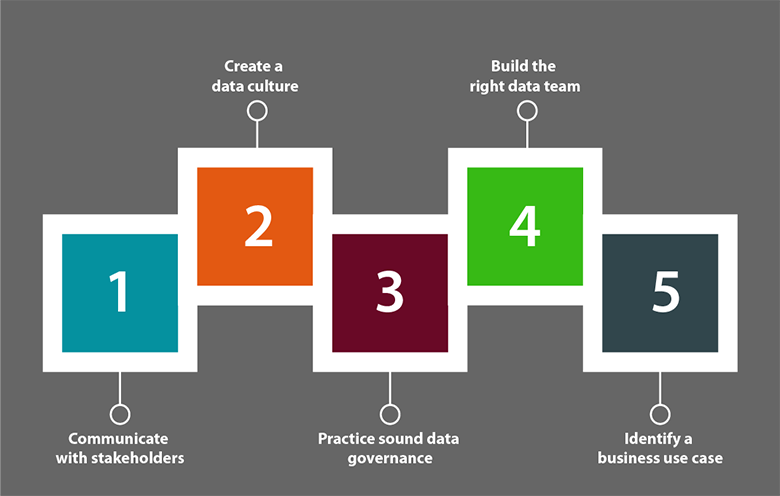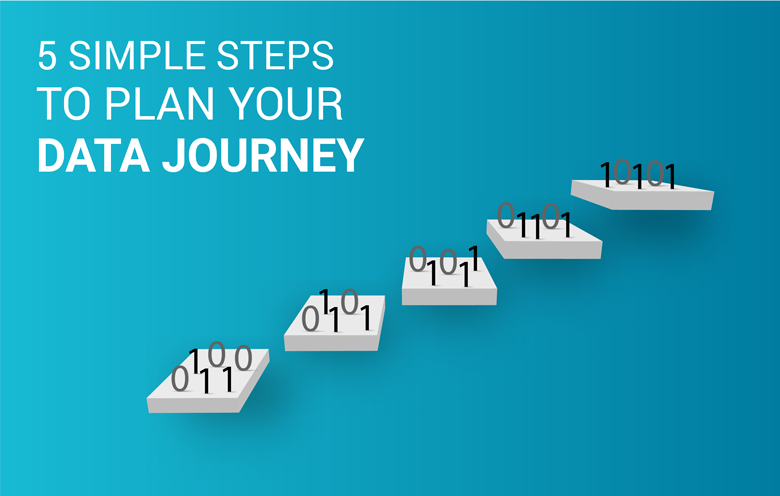Data is becoming the focal point for industries to find information and insights, therefore several organizations have started their journey to becoming data-driven. According to a report by the International Institute for Analytics, by 2020, businesses using data will see $430 billion in productivity benefits over competitors who are not using data. Companies are looking forward to gaining this competitive advantage and use data to gain an edge over their competitors.
Though it is evident that companies love data, the other side of the reality is that only a few have mastered the skill of becoming a great data-driven organization. Most of the companies fail to understand that being data-driven is not something that you can simply achieve by using a set of tools and implementing them. This is why companies need data consultants who can help them with the right strategy and implementation since it is a long journey, which requires a huge shift in organizational structure and governance framework. It is much more than just having the right technology. It actually involves effort from individuals at the organization to change their mindset, develop a vision and work relentlessly on creating the right foundation for a data-driven setup.
Gartner research director Lisa Kart says, “A successful advanced analytics strategy is about more than simply acquiring the right tools. It’s also important to change mindsets and culture, and to be creative in search of success.”
The journey to become a data-centric organization
Before you embark on your data journey, it is important to plan a data strategy and set realistic expectations for yourself. Over time, there will be strategic shifts and resetting of goals, thereby helping you to derive more value. However, the basic principles to build a data-driven enterprise will always remain the same. Therefore, we share some key areas where you should focus to ensure that your data journey not only has a great start, but also continues to empower your organization in the longest run.

Communicate with stakeholders
It is important to keep your senior management in the loop so that they have a clear idea where you are heading towards your data strategy. However, it is great to start your journey with a specific business case, but you also need to keep the big picture in mind. Explain your executives and managers how data can help to improve key business functions like human resources, supply chain, marketing and more. This will help you and your C-level executives to set strategic goals, like higher-value creation, customer acquisition, cost-cutting in marketing, and churn reduction.
Create a data culture
However well planned a data-strategy might be, it always needs a data-oriented culture within your organization to be successful. Many such plans fail when employees resist changing, as they are not properly educated about the benefits that data brings to decision making. Therefore, it becomes the responsibility of chief data officer to make every individual at the company excited about the data and what all can be achieved using it. A good approach is to start identifying data enthusiasts in other teams who can encourage their team members to participate in this great cultural shift.
Practice sound data governance
Before you start collecting huge amounts of data and find it difficult to maintain, manage and work upon, it advisable to develop a data governance framework. A well-thought approach to data governance helps in realizing the full value of data. It provides your organization with good business metadata, effective schema management, better data profiling, and lineage transparency. By assessing and improving the quality of data, it also keeps your data lake clean and readily available for use. Therefore, a good governance policy is important for long-term success.
Build the right data team
The next thing is to choose the right people and build a data team that adds value to your business. Instead of looking for those elite data scientists and data unicorns, you can hire individuals who have expertise in one or more areas of data analytics. Some may be good at critical thinking while others may be proficient in math, coding or problem-solving. The focus should not be on finding perfect data experts but to hire individuals who, when combined, can make the perfect data team for your organization. Another great option is to contact a data services company and save your time from building a team from scratch.
Identify a business use case
Once you have your data team sorted, your next action should be to identify potential business use cases. Prioritize these use cases on a number of factors like feasibility, effectiveness, and business value to choose the one which would benefit the most with data analytics. The aim is to create a data-driven strategy for your organization by focusing on one use case at a time. This would help you to measure the effectiveness and performance of your data strategy, learn from your mistakes and improve. Adopting an agile approach for data analysis helps to provide incremental value and better solutions for the future.
Final say
Through this journey of becoming a data-centric organization, you will learn a lot about the company’s information assets, business policies, marketing strategies, and work culture. This will help you in identifying opportunities where you can apply data to various parts and processes of the business. The data journey is going to be worth every bit and will surely add a lot more value to your organization. If you feel your business is ready for a data transformation, just contact our data experts and they will guide you along the entire data journey.









